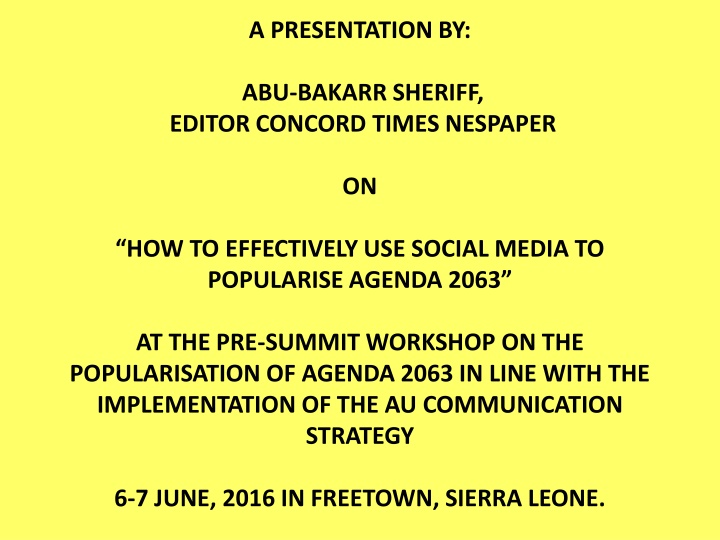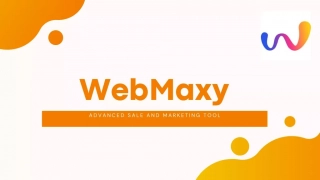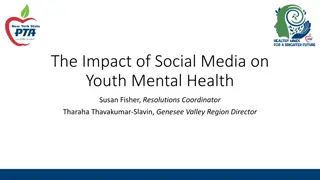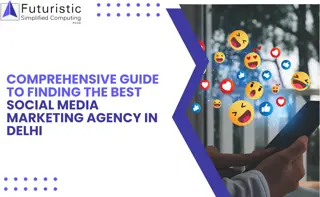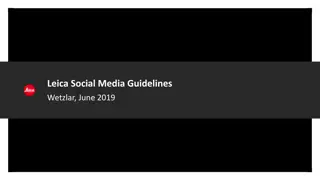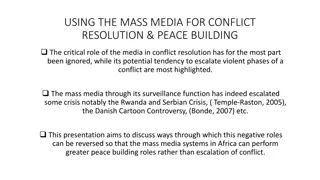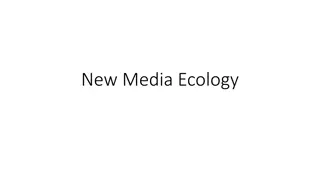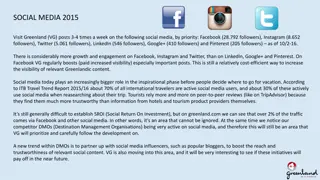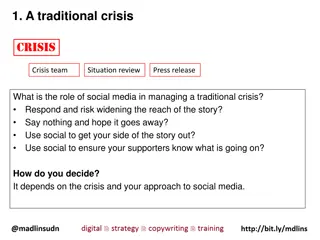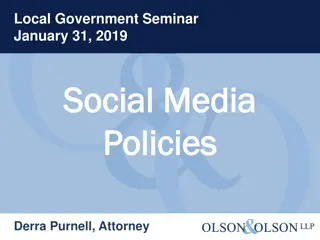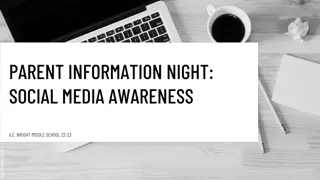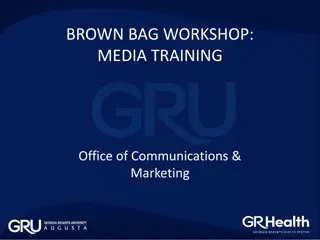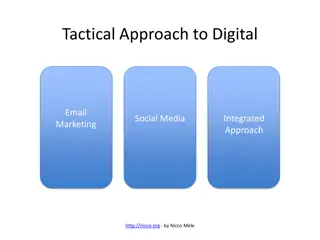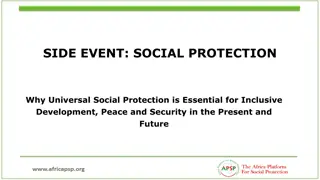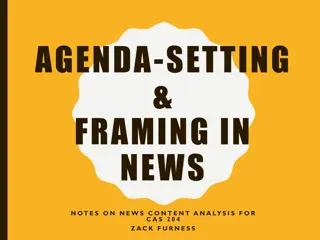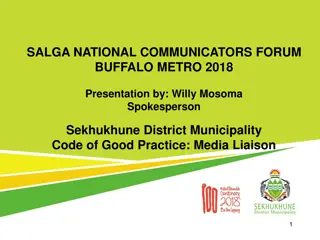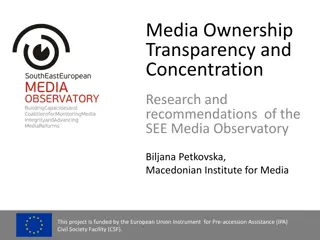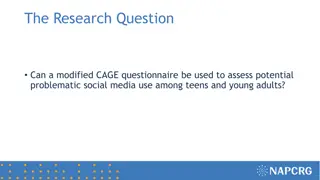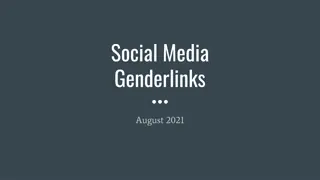Leveraging Social Media for Agenda 2063 Popularization
Explore the potential of social media in amplifying the reach and impact of AU's Agenda 2063. Understand the historical context and significance of Agenda 2063, highlighting the transition from the OAU to AU. Embrace the collective dream of a prosperous Africa through actionable steps and effective communication strategies. Witness how social media can play a pivotal role in engaging citizens and stakeholders towards achieving the vision of Agenda 2063.
Download Presentation

Please find below an Image/Link to download the presentation.
The content on the website is provided AS IS for your information and personal use only. It may not be sold, licensed, or shared on other websites without obtaining consent from the author.If you encounter any issues during the download, it is possible that the publisher has removed the file from their server.
You are allowed to download the files provided on this website for personal or commercial use, subject to the condition that they are used lawfully. All files are the property of their respective owners.
The content on the website is provided AS IS for your information and personal use only. It may not be sold, licensed, or shared on other websites without obtaining consent from the author.
E N D
Presentation Transcript
A PRESENTATION BY: ABU-BAKARR SHERIFF, EDITOR CONCORD TIMES NESPAPER ON HOW TO EFFECTIVELY USE SOCIAL MEDIA TO POPULARISE AGENDA 2063 AT THE PRE-SUMMIT WORKSHOP ON THE POPULARISATION OF AGENDA 2063 IN LINE WITH THE IMPLEMENTATION OF THE AU COMMUNICATION STRATEGY 6-7 JUNE, 2016 IN FREETOWN, SIERRA LEONE.
INTRODUCTION The AU Agenda 2063 was adopted in 2013 by Heads of State of the African Union as part of their Pan African renaissance ideal for prosperous and peaceful Africa, driven by its own citizens and representing a dynamic force in the international arena. Agenda 2063 is an approach to how the continent should effectively learn from the lessons of the past, build on the progress now underway and strategically exploit all possible opportunities available in the short, medium and long term, so as to ensure positive socioeconomic transformation within the next 50 years. vision and African an integrated,
When the great illustrious African leaders founded the Organisation of African Unity on 25 May, 1963, the overarching vision was to promote unity and solidarity of African states; coordinate and intensify their cooperation and efforts to achieve a better life for the peoples of Africa; among others. While no effort was spared to achieve those lofty goals, it is no gainsaying that the said goals would not have been achieved without effective and efficient communication among the various leaders and their subjects.
The name change from OAU to AU was effected in 2002 at the Durban Summit, by heads of states. Since then, the AU has positioned itself to serve the continent and its peoples and to play a pre-eminent role in global affairs, particularly where they relate and touch on the continent and its peoples. The AU S vision to accelerate the process of integration in Africa, support the empowerment of African states in the global economy and address the multifaceted social, economic and political problems facing the continent cannot be achieved without MEASURABLE, ATTAINABLE, TIMEBOUND] VISION; AGENDA 2063. a SMART [SPECIFIC, REALISTIC AND
I regard Agenda 2063 as a dream of African leaders and administrators for a peaceful and prosperous continent. Someone had said: a Dream written down with a date becomes a Goal; a Goal broken down into steps becomes a Plan; a Plan backed by Actions makes your Dreams come true. Our gathering here is part of efforts aimed at actualizing the dream of Agenda 2063 . And my specific task is to stimulate discussions on the How of actualizing effective use of Social Media or New Media to popularize the AU s Agenda 2063.
WHAT IS SOCIAL MEDIA? According to BusinessDictionary.com, Social Media is Primarily internet or cellular phone based applications and tools to share information among people. Social Media includes popular networking websites, like Facebook and Twitter; as well as bookmarking sites like Reddit. It involves blogging and forums and any aspect of an interactive presence which allows individuals the ability to engage in conversations with one another, often as a discussion over a particular blog post, news article, or event. Other Social Media platforms include Whatsapp (which is very popular among youths on the continent), LinkedIn, Instragram, YouTube etc. Facebook, Twitter and YouTube are the top 3 popular social media platforms in the world.
Many people use one form of Social Media or another primarily online, in order to keep in touch with family or friends; or to either be informed or to inform others about a variety of topics within the realm of entertainment, news, or any other topic of their choosing. Social Media presents a new unique opportunity for quick dissemination of information around the world, with Africa being no exception. However, in the days of yore, the world had not changed into a global village, the old media newspapers, television and radio was the sole source of information dissemination.
CONTEXT New/Social Media now competes with old/tradition media, although radio is still popular in both urban and rural Africa. Illiteracy level is still very high in most parts of the continent Internet penetration is relatively low, compared to other geopolitical regions Electricity or power generation presents a critical challenge to access the internet and by extension social media Political risk factors though remain high, such as conflict, deliberate internet interruption based on political consideration or national security imperative
CONTEXT CONTINUED There are some positives to draw from the current contextual reality insofar as internet/mobile usage is concerned: Internet penetration, albeit still low, deeper than say 20 years ago. As a result, there more smart phone users on the continent. Even in rural areas, mobile phones users have exponentially increased and are increasing. Africa is rising!
DEMOGRAPHICS The current population of Africa is approximately 1.2 billion, according to United Nations estimates. That is equivalent to 16.14% population. of the total world Africa ranks number 2 among regions of the world (roughly equivalent to "continents"), ordered by population. 39.8 % of the population is urban, while the median age is 19.5 years. That makes Africa a youthful continent, with majority of the youths vibrant mobile phone/internet users.
SOCIAL MEDIA USAGE/USERS In 2015, there was an estimated 2.04bn users of social media around the world; that number is expected to increase to 2.22bn in 2016, according to statista.com. Africa has 439 internet users, third behind East and South Asia respectively, but more than Western Europe and North Africa. South Africa is among the top 20 Facebook users in world; 8 on the global list of twitter users.
According to a report by CNN this year, 120 million people in Africa are using Facebook each month, with over 80% via mobile. 4.5 million of those Facebook users are based in Kenya, 15 million in Nigeria and 12 million in South Africa. Overall, its is estimated that approximately 9% of Africans use social media, with South Africans among the world leaders in time spent on social networks with an average of 3.2 hours a day, compared to a global average of 2.4 hours.
The Top 10 Internet Users in Africa are: Nigeria 92.7m Egypt 48.3m Kenya -31.9m South Africa 26.8m Morocco 20.2m Sudan 9.3m Uganda 8.5m Tanzania 7.6m Algeria 7.2m Tunisia 5.4m Source: www.internetworldstats.com
What this means is that with effective and efficient use of social media, the AU s Agenda 2063 can have visibility among 400 odd African internet users, at home and in the Diaspora, although the majority are on Facebook and they number 120m. Millions more can be reach via mobile phones: National level targeting journalists, teachers, CSOs, public and private sectors officials by means of targeted messages. This method was quite successful during the Ebola outbreak in West Africa, where regular alerts kept people informed about the virus. That can be replicated continental level, as well as among Diaspora communities. at sub-regional and
EFFECTIVE USE OF SOCIAL MEDIA TO POPULARISE AGENDA 2063
1.Leverage the visual promotion of contents: Most often than not tweets with images generate more comments. Same as photos on Facebook and images on LinkedIn. Three of the newest social networks, Pinterest, Instagram, and Snapchat, are based entirely on images. According to Neal Scaffer, for effective usage, users should Create not only a branded featured image to share with your post, but also create separate images for each of the main points in your content so they can be shared when you repeatedly post them to social media.
2.Headlines matters You can create a buzz and seek users attention by the kind of headlines you choose for your posts. In essence go for eye catching titles and sub-titles.
3. Customize your platform customize your posting on each social media platform this includes the headline, image, and a description of the content you are sharing to suit your unique features and characteristics. In our case, we should adopt Africa themes and features to attract users to our website, facebook page, twitter account and Instragram platform. Remember there is competition from many users. Hence to catch the users eye, the more optimized your post is for a particular platform, the more effective your social media platform will be.
All you need is an attention-grabbing headline, a clean, relevant image that piques interest (which might be different from the featured image used in your content), and a short, compelling description. By so doing, readers are enticed to click on your content. In the same manner, appending your content with hashtags (e.g. #African Union Ebola Mission) can help make your content more discoverable for those social networks that support them.
4. Share at the right time For example, know the different time zones in Africa and target users accordingly. The content shared needs a wide reach, so you have to deliberately target them when they are online and active. Therefore, those in charge of posting can compile a posting schedule to ensure they post during a certain time of the day. Keep in mind that different social media platforms may not have the same peak times. Some social media platforms have features designed to aid you in this process, such as Facebook Insights. In addition, third FollowerWonk help estimate the best times for some platforms. party tools such as
5. Share your blog post or contents more than once While the effect may be counterproductive as some people detest multiple posts, data supports the fact that sharing post more than once increases traffic, hit multiple times zones, and reach new followers. However, to avoid any fallout, slightly tweak the headlines anytime you repost or retweet.
6. BE INTERACTIVE, ASK QUESTIONS Create an enabling platform for communication with users and increase the chances they engage with your content by asking for questions and feedback. Neal Scaffer says Because social media was made for people and not for businesses, you should always be striving to create a human connection with social media users. He recommends that: To generate feedback and promote engagement on social media, include a question with your content that compels readers to respond.
7. Share on the right platform There are scores of social media platforms. While it is advantageous to spread out, the merits of limiting usage to the top users cannot be overemphasized. This is particularly salient for Africa, where users are limited or more adept at using particular social media platforms such as facebook, LinkedIn, Whatsapp, YouTube (multimedia contents), with few using twitter. (For example the AU website has more Facebook users than twitter only 206 followers!
8. Maximize your brand advocates Encourage staff, not least communicators (press attaches, information and communications officers) to share and like your contents on Facebook, YouTube, Instagram, twitter, flickr etc to help spread the message.
9. Leverage communities This is closely tied to the above; here staff and advocates in other communities can help share your content to the many groups and communities on LinkedIn, Twitter chats, Google Plus communities, shared Pinterest boards, and even Facebook Groups.
CONCLUSION Remember what the Minister of State in Foreign Affairs and International Cooperation told us at the opening ceremony yesterday, quoting Chinua Achebe, that Stories or narratives are the most durable of human achievements. The stories you tell will outlive you, so you better tell great stories. The late literary icon added that If you don t like someone s story, write your own. Africa has to tell its own story to the world, but first to her children, who will help disseminate those good stories around the world, using various social media platforms. But that has to be done effectively and with efficacy. When it comes to promoting content, social media is one of the most powerful tools available; by utilizing one or all of the 9 ways above, Agenda 2063 would be promoted and popularised among millions on the continent and out of it.
THANK YOU! MERCI! Obrigado!
